The New Faces of HIV/AIDS
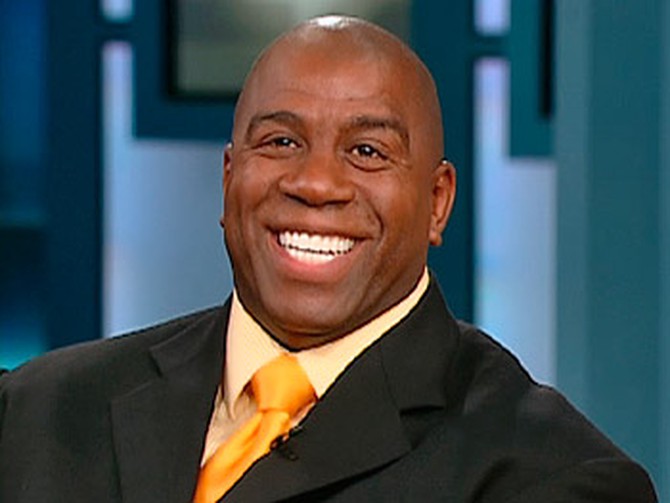
In the early '90s, Magic Johnson was at the top of his game as point guard for the L.A. Lakers. One of the greatest NBA players of all time, had led his team to five NBA championships and made millions of dollars in endorsements. Then on November 7, 1991, he shocked the world by announcing he was HIV-positive and was abruptly retiring from basketball.
Now, 15 years after that shattering press conference, Magic is living a healthy lifestyle and feeling great. While rumors have spread that he either has been cured of the disease or has access to special medications due to his celebrity, Magic says these rumors are false. His good health is a direct result of his lifestyle, positive attitude and commitment to taking his medication.
Magic says he needs to stay healthy just to keep up with his own life. He works to educate people about HIV and AIDS, oversees an ever-expanding empire of real estate holdings and businesses, and serves as vice president and co-owner of his former team, the L.A. Lakers.
Now, 15 years after that shattering press conference, Magic is living a healthy lifestyle and feeling great. While rumors have spread that he either has been cured of the disease or has access to special medications due to his celebrity, Magic says these rumors are false. His good health is a direct result of his lifestyle, positive attitude and commitment to taking his medication.
Magic says he needs to stay healthy just to keep up with his own life. He works to educate people about HIV and AIDS, oversees an ever-expanding empire of real estate holdings and businesses, and serves as vice president and co-owner of his former team, the L.A. Lakers.
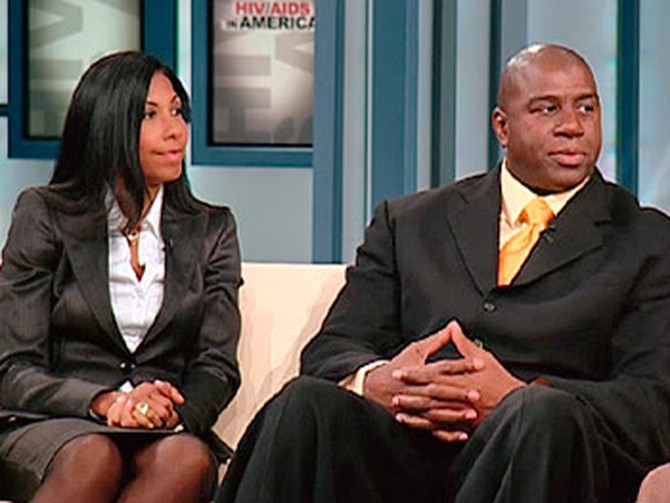
When Magic and his wife, Cookie, learned Magic was diagnosed with HIV, they say they were scared of both the disease and going public with the information. "At the time, you know, HIV and AIDS were looked at as this horrible disease that you could catch just by touching someone. ... Fifteen years ago we were still pretty ignorant," Cookie says. "I felt people just would not embrace us. We're very private people and I wanted to keep it private. I was ready to fight it, but I wanted to do it privately. I didn't think we had to do it with the whole world."
But after a meeting with Elizabeth Glaser, who was dying from AIDS at the time, Magic had a different idea. "I talked to [Elizabeth] about two or three times and she said, 'The only thing I want you to do is to become the face of HIV and AIDS. You can really change things. You're going to live for a long time because there are a lot of great medicines coming down the pipeline, but I really want you to go public because people really need to know that HIV and AIDS are out here in a big way.'"
But after a meeting with Elizabeth Glaser, who was dying from AIDS at the time, Magic had a different idea. "I talked to [Elizabeth] about two or three times and she said, 'The only thing I want you to do is to become the face of HIV and AIDS. You can really change things. You're going to live for a long time because there are a lot of great medicines coming down the pipeline, but I really want you to go public because people really need to know that HIV and AIDS are out here in a big way.'"
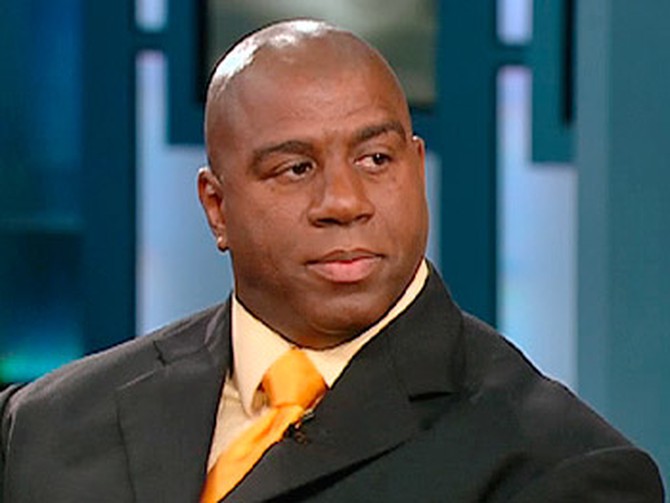
When Magic made his announcement, he says he didn't worry about a negative reaction from his family and closest friends, but he did occasionally run into ignorance. "Some people who used to give you the handshake and the hug, they'd give you the peace sign now, or the power sign," Magic says.
After playing on the historic Olympic "Dream Team" in 1992, Magic even tried to make an NBA comeback in 1995. But some other players in the league were upset, believing, incorrectly, that it was possible to contract HIV in the course of game play. "We were uneducated at that time," Magic says. "We had to educate everybody about the disease. You couldn't get it by playing basketball against me or high-fiving me or hugging me."
Spurred by Magic's announcement, the public, especially in minority communities, became educated about the realities of HIV and AIDS. In recent years, Magic says he's witnessed a turn. "When I first announced, everybody reacted. Now they're going back," Magic says. "In our community, we have so many issues in terms of black men in prison, and then also living a double life, on the down low. ... And then a lot of people who get HIV who are minorities feel they can't go to their families because of what their family's reaction is going to be."
After playing on the historic Olympic "Dream Team" in 1992, Magic even tried to make an NBA comeback in 1995. But some other players in the league were upset, believing, incorrectly, that it was possible to contract HIV in the course of game play. "We were uneducated at that time," Magic says. "We had to educate everybody about the disease. You couldn't get it by playing basketball against me or high-fiving me or hugging me."
Spurred by Magic's announcement, the public, especially in minority communities, became educated about the realities of HIV and AIDS. In recent years, Magic says he's witnessed a turn. "When I first announced, everybody reacted. Now they're going back," Magic says. "In our community, we have so many issues in terms of black men in prison, and then also living a double life, on the down low. ... And then a lot of people who get HIV who are minorities feel they can't go to their families because of what their family's reaction is going to be."
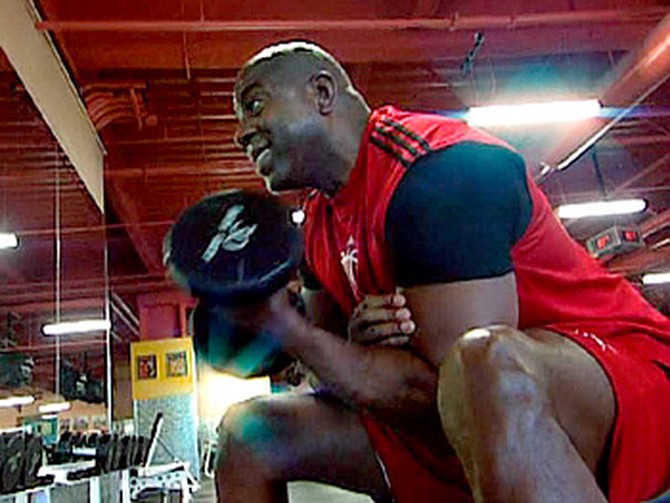
When they first learned of Magic's status as HIV-positive, Magic and Cookie say they both believed it was essentially a death sentence. They quickly learned otherwise, especially for people who are diagnosed early in their infection.
To strengthen his immune system, Magic maintains a strenuous health regimen with a daily workout that includes an hour on an exercise bike followed by weight training. His diet consists of low-fat, low-sugar meals like skinless chicken, vegetables, fruits. He also takes three pills twice a day.
Magic says the early years of his treatment were tough as side effects from the medications wore him down. "In the beginning it was terrible—mood swings, going to the restroom a lot, and [my] stomach just upset," he says. "But I think my workout balances the medicine out."
To get over these rough times, Magic says it was necessary to maintain a positive attitude. "It plays, to me, just as much [of a role] as the medicine plays," he says.
Magic and Cookie initially didn't know how the diagnosis would affect their sex life. "We got a lot of information right away," Cookie says. "It changed a little bit, but you just have to make sure that you use your protection. And once you do that, it's very normal."
"We're still doing our thing," Magic adds. "You know, you've still got to live. Life does go on. That's what everybody doesn't understand. You're going to still live a normal life [with HIV and AIDS]."
To strengthen his immune system, Magic maintains a strenuous health regimen with a daily workout that includes an hour on an exercise bike followed by weight training. His diet consists of low-fat, low-sugar meals like skinless chicken, vegetables, fruits. He also takes three pills twice a day.
Magic says the early years of his treatment were tough as side effects from the medications wore him down. "In the beginning it was terrible—mood swings, going to the restroom a lot, and [my] stomach just upset," he says. "But I think my workout balances the medicine out."
To get over these rough times, Magic says it was necessary to maintain a positive attitude. "It plays, to me, just as much [of a role] as the medicine plays," he says.
Magic and Cookie initially didn't know how the diagnosis would affect their sex life. "We got a lot of information right away," Cookie says. "It changed a little bit, but you just have to make sure that you use your protection. And once you do that, it's very normal."
"We're still doing our thing," Magic adds. "You know, you've still got to live. Life does go on. That's what everybody doesn't understand. You're going to still live a normal life [with HIV and AIDS]."
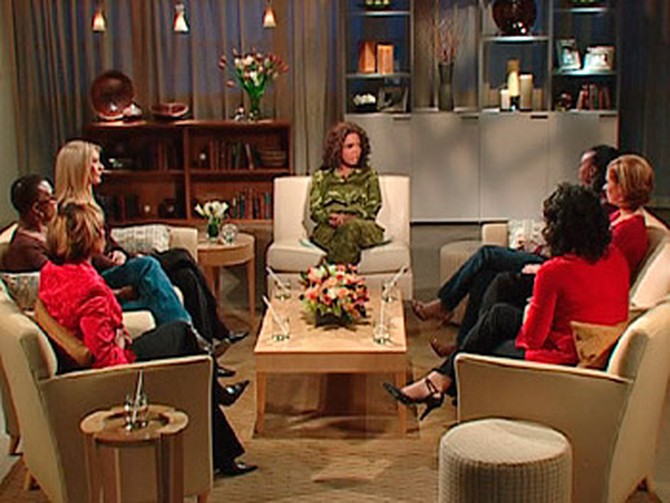
Since AIDS became a part of the national consciousness in the early 1980s, most Americans have thought of it as a disease that primarily affects gay men, drug addicts and promiscuous people. When Oprah sits down with six HIV-positive women, she finds out that this is not the case.
Chelsea, a 24-year-old mother, says she found out she was HIV positive when she became pregnant with her son. Cherrell, Marvelyn and Regan say they contracted the disease from men they were dating seriously. Marvelyn was only 19 years old when she found out she was HIV positive.
Precious says she was infected by a man who may have had sex with other men, while Yvette, a 36-year-old mother of two, believes she contracted the disease 15 years ago through unprotected sex. Yvette lived with HIV for 12 years before she was diagnosed.
Many women think they're safe from infection, but according to the Centers for Disease Control and Prevention, women represent a growing share of newly reported AIDS cases in America, rising from just 8 percent of cases in 1985 to 27 percent of cases in 2004.
"I was a junior in college, so I was very well educated, and I had been in a monogamous relationship for five years," Chelsea says. "I definitely didn't think I was at risk."
A majority of new infections among American women are the result of unprotected heterosexual sex. "I used condoms with people I was with, but I didn't use them consistently...and I probably didn't use them correctly," Yvette says.
Chelsea, a 24-year-old mother, says she found out she was HIV positive when she became pregnant with her son. Cherrell, Marvelyn and Regan say they contracted the disease from men they were dating seriously. Marvelyn was only 19 years old when she found out she was HIV positive.
Precious says she was infected by a man who may have had sex with other men, while Yvette, a 36-year-old mother of two, believes she contracted the disease 15 years ago through unprotected sex. Yvette lived with HIV for 12 years before she was diagnosed.
Many women think they're safe from infection, but according to the Centers for Disease Control and Prevention, women represent a growing share of newly reported AIDS cases in America, rising from just 8 percent of cases in 1985 to 27 percent of cases in 2004.
"I was a junior in college, so I was very well educated, and I had been in a monogamous relationship for five years," Chelsea says. "I definitely didn't think I was at risk."
A majority of new infections among American women are the result of unprotected heterosexual sex. "I used condoms with people I was with, but I didn't use them consistently...and I probably didn't use them correctly," Yvette says.
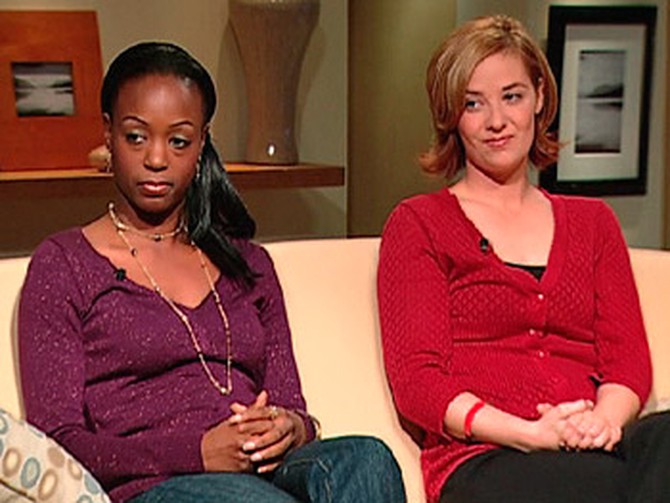
Most of the women take a complex cocktail of medication every day, which can cause lasting side effects. Regan estimates that she's taken 48,000 pills since she was diagnosed in 1996. In 2003, Yvette was taking 23 pills a day, but now her daily regimen is down to seven. Marvelyn continues to take nine "horse pills" every day.
Medical advances have simplified the treatment of many HIV/AIDS patients, but some say there has been little advancement in the way people treat HIV-positive men and women. "The stigma is the worst part," Regan says. "I couldn't even get care sometimes because I would go to get blood work at my local hospital ... the nurse would come in and say, 'I'm not going to take this woman's blood. She's HIV positive.'"
The public's perception of HIV-positive women also makes dating very difficult. Chelsea says she always tries to tell men that she has HIV on the first date. "When I told people, like guys, their reactions were, like, 'Oh, God, where's the closest exit? Let me get out of here as fast as I can,'" she says.
Marvelyn says some men still try to convince her to have unprotected sex, but she is adamant about using condoms. Infected people run the risk of reinfecting themselves with a different strain of HIV if they have unprotected sex. Because the virus mutates so rapidly, these new strains could be resistant to the medications they're currently taking.
Medical advances have simplified the treatment of many HIV/AIDS patients, but some say there has been little advancement in the way people treat HIV-positive men and women. "The stigma is the worst part," Regan says. "I couldn't even get care sometimes because I would go to get blood work at my local hospital ... the nurse would come in and say, 'I'm not going to take this woman's blood. She's HIV positive.'"
The public's perception of HIV-positive women also makes dating very difficult. Chelsea says she always tries to tell men that she has HIV on the first date. "When I told people, like guys, their reactions were, like, 'Oh, God, where's the closest exit? Let me get out of here as fast as I can,'" she says.
Marvelyn says some men still try to convince her to have unprotected sex, but she is adamant about using condoms. Infected people run the risk of reinfecting themselves with a different strain of HIV if they have unprotected sex. Because the virus mutates so rapidly, these new strains could be resistant to the medications they're currently taking.
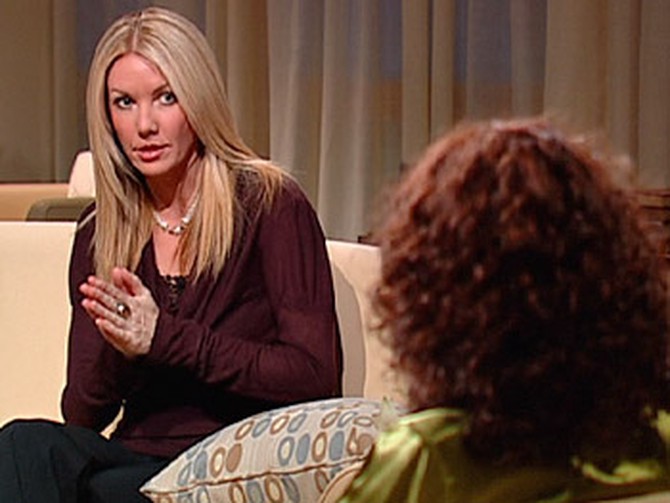
Living with HIV and AIDS has taught these six women many important lessons. Regan says she wants all women to know that they need to get tested, even if they're in monogamous relationships.
"People need to get tested on a regular basis and take responsibility for their own status," she says. "Women need to know that this is a matter of protecting yourself. ... Buy condoms and insist that men wear them."
Chelsea hopes that sharing her story will help people open their minds and be less judgmental of those living with HIV.
Yvette nearly lost her life due to AIDS-related illnesses. She hopes that women will take her message to heart and start protecting themselves from the virus. "It can happen to anyone," she says. "HIV does not discriminate. It doesn't care what color you are, what nationality, religion. If you have unprotected sex one time, you can become infected."
"People need to get tested on a regular basis and take responsibility for their own status," she says. "Women need to know that this is a matter of protecting yourself. ... Buy condoms and insist that men wear them."
Chelsea hopes that sharing her story will help people open their minds and be less judgmental of those living with HIV.
Yvette nearly lost her life due to AIDS-related illnesses. She hopes that women will take her message to heart and start protecting themselves from the virus. "It can happen to anyone," she says. "HIV does not discriminate. It doesn't care what color you are, what nationality, religion. If you have unprotected sex one time, you can become infected."
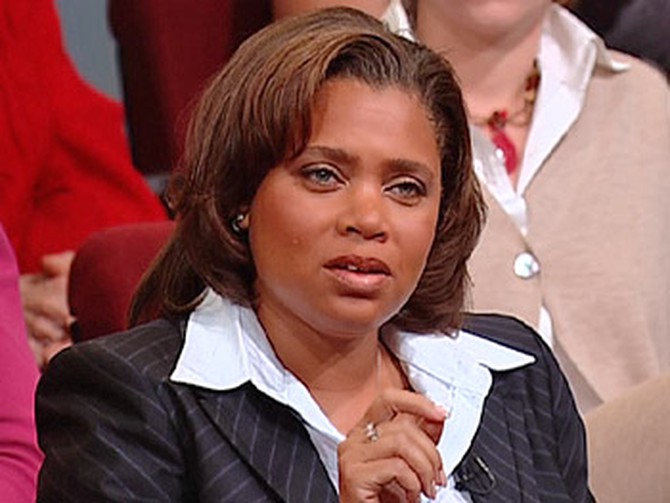
Dr. Kimberly Smith, an infectious disease specialist at Chicago's Rush Medical Center, has been on the front lines of the HIV epidemic for more than a decade. Over the years, she has seen a dramatic increase in the number of women and African-Americans who've contracted HIV.
There's not a simple explanation for why more women are becoming infected, but Dr. Smith says she can pinpoint three important causes. "The first is lack of perception of risk," she says. "The second is lack of power in relationships, and then the third is the role that substance use plays."
Many women in monogamous relationships don't think they are at risk, Dr. Smith says, but their partners could be putting them in danger without them knowing it. If your significant other is having sex with other men or women, abusing drugs or has been to prison, your chances of contracting HIV are greatly increased.
A woman who is dependent on a man, emotionally or financially, may not have the power to withhold sex or demand that the man wear a condom, Dr. Smith says. Condom use is critical to preventing the spread of HIV.
Dr. Smith says we can't ignore the role drugs play in the fight against AIDS. "Substance use plays a role as well. ... Not only intravenous drug use, but also importantly crack cocaine," she says. "When individuals are addicted to crack cocaine ... they do very desperate things in order to get access to the drugs."
There's not a simple explanation for why more women are becoming infected, but Dr. Smith says she can pinpoint three important causes. "The first is lack of perception of risk," she says. "The second is lack of power in relationships, and then the third is the role that substance use plays."
Many women in monogamous relationships don't think they are at risk, Dr. Smith says, but their partners could be putting them in danger without them knowing it. If your significant other is having sex with other men or women, abusing drugs or has been to prison, your chances of contracting HIV are greatly increased.
A woman who is dependent on a man, emotionally or financially, may not have the power to withhold sex or demand that the man wear a condom, Dr. Smith says. Condom use is critical to preventing the spread of HIV.
Dr. Smith says we can't ignore the role drugs play in the fight against AIDS. "Substance use plays a role as well. ... Not only intravenous drug use, but also importantly crack cocaine," she says. "When individuals are addicted to crack cocaine ... they do very desperate things in order to get access to the drugs."
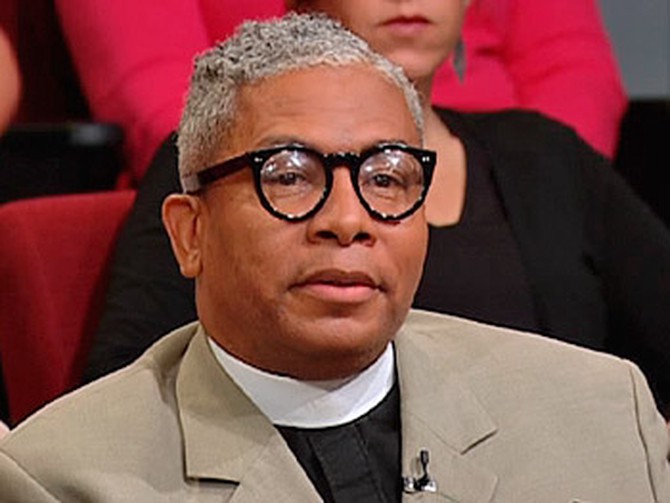
According to the most recent data, AIDS is the number one killer for African-American women ages 25 to 34. Eugene Rivers, reverend at the Azusa Christian Church in Boston, says the increased number of black women with HIV reflects a moral and cultural crisis in the black community.
"There is a culture of promiscuity that says we must celebrate big pimping, booty popping and bootylicousness," he says. "That is promoted and accepted, and it demeans black women in ways that are absolutely absurd. ... The black community and America in general has to confront this crisis because we are now reducing a generation of young women to a biological underclass."
Reverend Rivers says that until it's no longer accepted for men to demean women and encourage promiscuity, the infection will continue to spread. "Unprotected sex is now functioning as an instrument of mass destruction," he says.
"There is a culture of promiscuity that says we must celebrate big pimping, booty popping and bootylicousness," he says. "That is promoted and accepted, and it demeans black women in ways that are absolutely absurd. ... The black community and America in general has to confront this crisis because we are now reducing a generation of young women to a biological underclass."
Reverend Rivers says that until it's no longer accepted for men to demean women and encourage promiscuity, the infection will continue to spread. "Unprotected sex is now functioning as an instrument of mass destruction," he says.
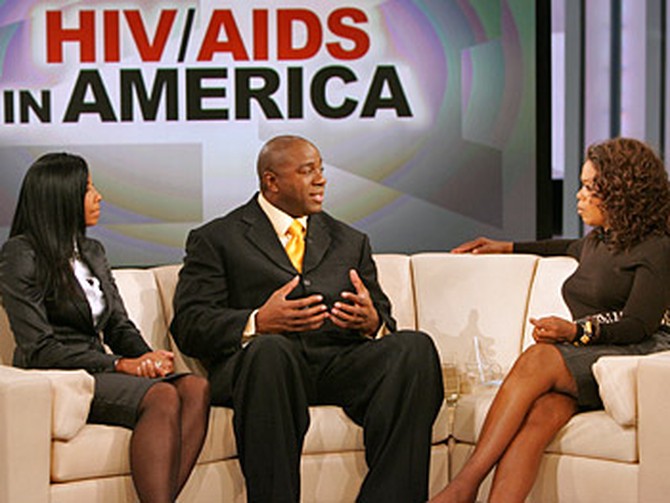
As the most public face of HIV and AIDS in America, Magic has worked to combat the disease. The AIDS Healthcare Foundation—the largest AIDS organization in the United States—runs four Magic Johnson Clinics in America. Besides managing care and paying for medicine for those who cannot afford it, these clinics provide community. "They have a place that they can go and socialize with other people who are living with the disease," Magic says.
The Magic Johnson Foundation has teamed with Abbott Laboratories for a new movement on World AIDS Day, December 1, 2006. "It's called 'I Stand with Magic.' It's going to be great because what we're going to do is do testing," Magic says. "I bought a lot of Laker tickets, so we have incentive for people to get tested. Our problem has been people have been tested, but they don't go back for the results. We want to make sure they go back."
The other focus of "I Stand with Magic" is spreading the truth about HIV and AIDS. "In the black community, what really hurts us—as well as the Latino community—is misinformation. They really don't know. There's a lot of crazy rumors that go on in our community."
The Magic Johnson Foundation has teamed with Abbott Laboratories for a new movement on World AIDS Day, December 1, 2006. "It's called 'I Stand with Magic.' It's going to be great because what we're going to do is do testing," Magic says. "I bought a lot of Laker tickets, so we have incentive for people to get tested. Our problem has been people have been tested, but they don't go back for the results. We want to make sure they go back."
The other focus of "I Stand with Magic" is spreading the truth about HIV and AIDS. "In the black community, what really hurts us—as well as the Latino community—is misinformation. They really don't know. There's a lot of crazy rumors that go on in our community."
Published 10/26/2006

